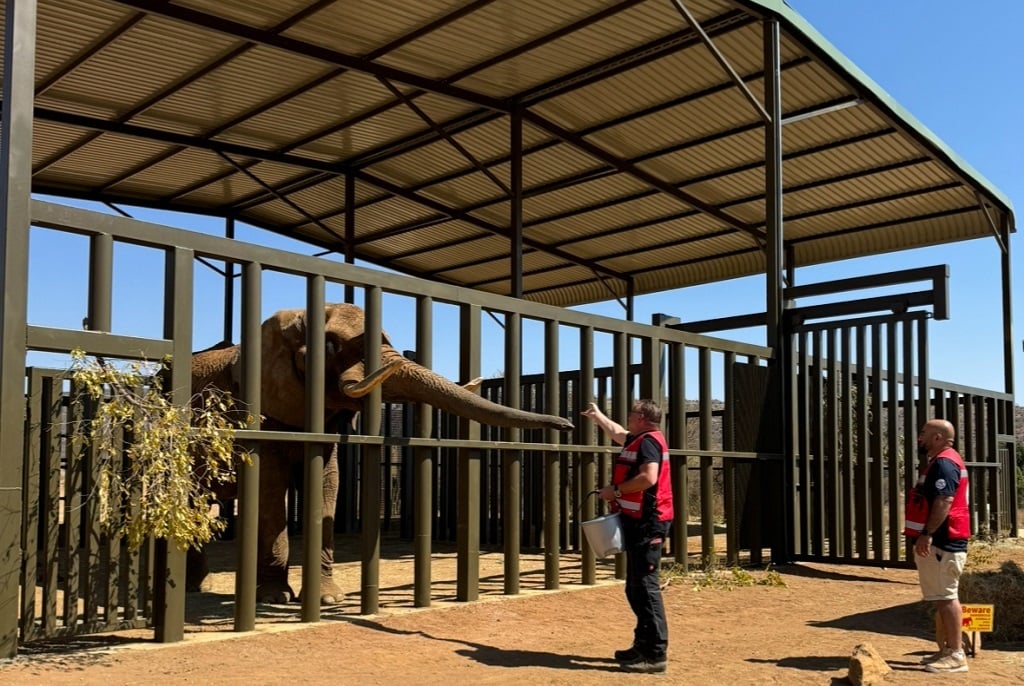
The elephant, now 42 years old, has been moved from the National Zoo in Pretoria to Shambala Private Game Reserve in Limpopo. (EMS Foundation/Supplied).
- An elephant, known for performing tricks at the Boswell Wilkie Circus, has been released back into nature after 40 years in captivity.
- The elephant, formerly known as Charlie, was captured and taken from his family in Hwange, Zimbabwe when he was approximately two years old.
- He had been based at the National Zoo in Pretoria since 2001.
- For climate change news and analysis, go to News24 Climate Future.
An elephant, formerly known as Charlie, has finally been released into the wild after 40 years of captivity.
A nonprofit concerned with the welfare of wild animals and vulnerable groups, the EMS Foundation, has been working to achieve his release since 2020.
According to the EMS Foundation, the elephant was captured and taken from his family in Hwange, Zimbabwe, when he was two years old. He was then sold to the now defunct Boswell Wilkie Circus where he performed tricks.
Thereafter, he had been based at the National Zoo in Pretoria since 2001. He was one of two elephants at the zoo. The other elephant, Landa, died in 2020 at the age of 36. According to conservationists, Landa would have lived longer in the wild.
Executive director Michele Pickover said the foundation was alerted to Charlie’s plight in 2020, after concerns were raised by the public that he had been lying down in his enclosure.
“Landa passed away in 2020, and Charlie was alone,” Pickover recalled.
Citing the work of the Pro-Elephant Network – which focuses on ending the capture and exploitation of elephants by humans, Pickover said that there are scientific reasons why elephants shouldn’t be in captivity. “They are very complex. Very intelligent. To keep an elephant in a small area is cruel,” she said.
EMS Foundation and others then started to lobby government to remove the elephant from the zoo and reintroduce him into a natural system.
“It took four years of heavy negotiations,” said Pickover. In 2022, the government made a decision to “retire” him.
READ | Babanango Reserve: Pioneering community-led conservation in KwaZulu-Natal
That’s when the real work started.
EMS Foundation drew on the expertise of other partners including PREN – which consists of elephant experts and legal minds – as well as Shambala Private Game Reserve in Limpopo, which is now the home of the elephant.
Pickover said several organisations collaborated on the project. Four Paws provided veterinary experts, and WeWild Africa helped manage logistics and food for the elephant. EMS Foundation funded the move and building of the elephant’s site in Shambala.
Following a four-hour trip to Shambala, the elephant, now 42 years old, finally made it to his new home this week. He was the last elephant in South Africa’s only national zoo and the first to be released into nature. According to EMS Foundation, the elephant enclosure at the zoo will be closed for good.
Pickover said the elephant now has a chance to heal wounds – both psychological and physical.
He won’t be left to fend for himself, as there is a whole programme in place to integrate him into the wild. She explained:
We’re not just dropping him off into a natural system. He’s been in captivity for 40 years. It will be a process to get him back to what an elephant should be.
He will slowly be reintroduced into bigger spaces at the reserve. The hope is that he will eventually meet the existing family of elephants on the reserve. It could take months or years for this to happen, Pickover explained.
There are early signs of improvement. In the last few days the elephant has started rumbling again. Elephants communicate by rumbling.
“In the four years he was observed at the zoo, you never heard a rumble,” said Pickover.
“He has a lot to overcome, but we will be with him every step of the way and help him become the elephant he should have been,” said Pickover.
READ | South Africans will have free access to some national parks for a week in September
Pickover said his condition in the zoo had been dire, and now that he is free, things could only get better.
According to the EMS Foundation, the elephant had to experience three of his friends dying prematurely in the zoo. His daughter also died when she was less than a month old.
The key message is that elephants should not be in captivity – keeping them in zoos has no educational value either because they are not in their right context, Pickover said. “You’re not seeing an elephant,” she said.
The EMS Foundation is also involved in a litigation to free three elephants at the Johannesburg Zoo.
The organisations have renamed the elephant Duma, which means thunder.
“We do not like the name Charlie, and we don’t think he likes it either,” said Pickover. But Duma seems more “respectful”.








Recent Comments